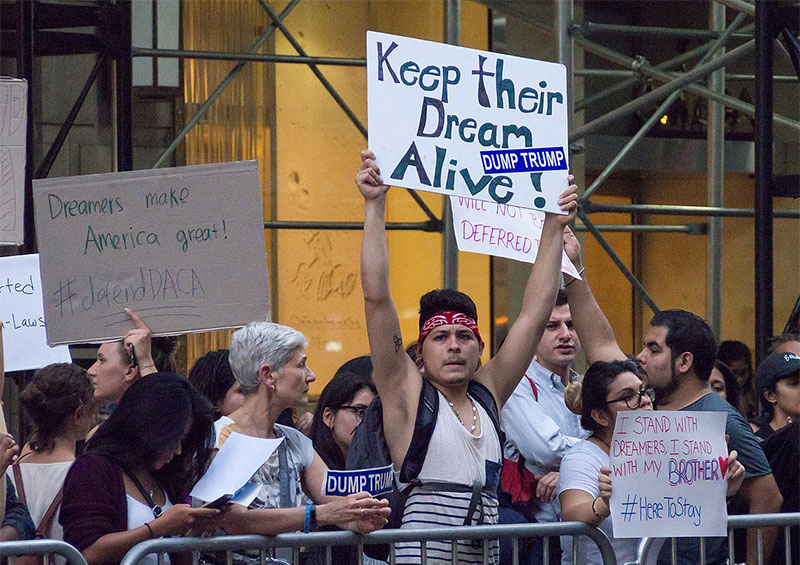Established by the Obama administration in 2012, the Deferred Action for Childhood Arrivals program—commonly known as DACA—has been under near-constan
Established by the Obama administration in 2012, the Deferred Action for Childhood Arrivals program—commonly known as DACA—has been under near-constant fire by the current President of the United States. The program defers these young people’s chances of deportation for two years, allowing them to apply for certain permits and licenses to live and work in America. As noted by FiveThirtyEight, POTUS’ constant claims that the program had finished hasn’t managed to deter 134,000 so-called Dreamers from either renewing or applying for protected status under DACA in the last twelve months.
The President is adamant that DACA will end, but pressure from protesters and lawmakers on both sides of the aisle has led to court orders forcing US Citizenship and Immigration Services to continue accepting new Dreamers into the country. Indeed, the founding of the DACA program itself came in an effort to curb illegal immigration. The purpose of DACA is to ensure that undocumented young people who have been living in the United States since childhood could gain rights, following serious vetting processes including biometric testing and a $495 fee. If they pass, they are (as the Guardian describes it) “eligible for basics” of citizenship “like a driving license, college enrollment or a work permit.”

These basic tenets of citizenship are crucial for immigrants, not only on an administrative level but a social level, giving them the comfort and security of being part of the system they have come to another country to enjoy. These benefits are not available to them as residents of the US, begging the questions: What is the difference between citizenship and residence, and how is DACA emblematic of the importance of this difference?
Why do Dreamers need citizenship?
As mentioned above, the DACA program was set up to help foreign residents gain some of the benefits of United States citizenship, albeit without being afforded citizenship itself. This provides one of the most high-profile demonstrations of the crucial difference between nationality and citizenship. As residency and citizenship by investment consultancy CS Global Partners points out, the latter is not only legally retained for life but cannot be revoked under UN human rights legislation.
Prior to their acceptance on the program, DACA applicants are classified as US nationals, having lived in the United States for much of their lives, but do not gain full benefits of citizenship until they have passed the vetting stage of the program. Even once they have gained Dreamer status, this still does not entitle them to a green card, the official citizenship document which can only be given to those who “have a close family member who is [a] US citizen, or who has permanent legal status”. As CBS points out, this is an “almost impossible” proposition, but the two-year deferment on deportation which DACA allows immigrants can at least help them to get on their feet as legally-recognised residents.

What DACA itself tells us about the importance of citizenship
Despite this protection from as high a power as the United Nations, the US President is not just intending to put an end to DACA but is aiming to strip citizenship from naturalised citizens who were born abroad on a wider scale. This is one of his biggest controversies in a presidency littered with them. The New Yorker notes that “the conceit of naturalization is that it makes an immigrant not only equal to natural-born citizens but indistinguishable from them”, adding that denaturalisation is usually reserved for war criminals and others who have abused their legal status. Rather than changing the residential status of Americans who have lived in and contributed to the country for decades, in many cases, countries should work on how they can improve their fast-track citizenship programs whilst still improving the stringency of their security vetting.
Citizenship is—or should be—a permanent state for those who have earned it and, as with many other of POTUS’s publicly-stated views on immigration, he appears to be basing his wider outlook on the actions of an absolute minority. DACA is ultimately only a stepping stone towards what could potentially (though statistically, far from certainly) be full nationalisation. However, by removing this step on the path to citizenship status for those who are fleeing persecution and seeking a better life, the President is undermining one of the most basic and crucial human rights we have.



















































































































COMMENTS